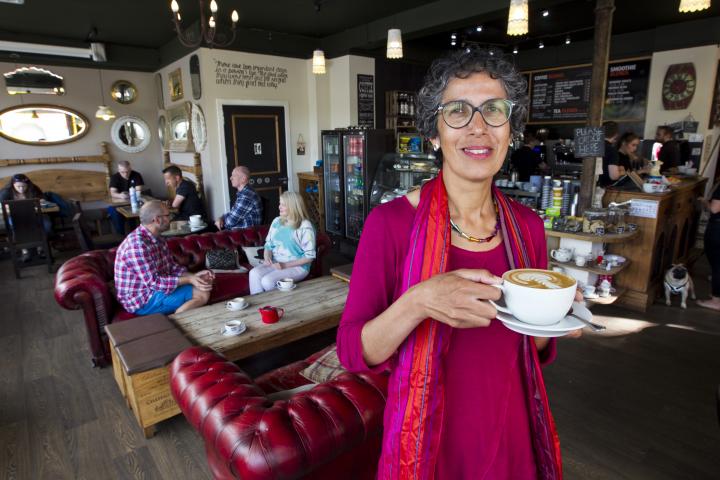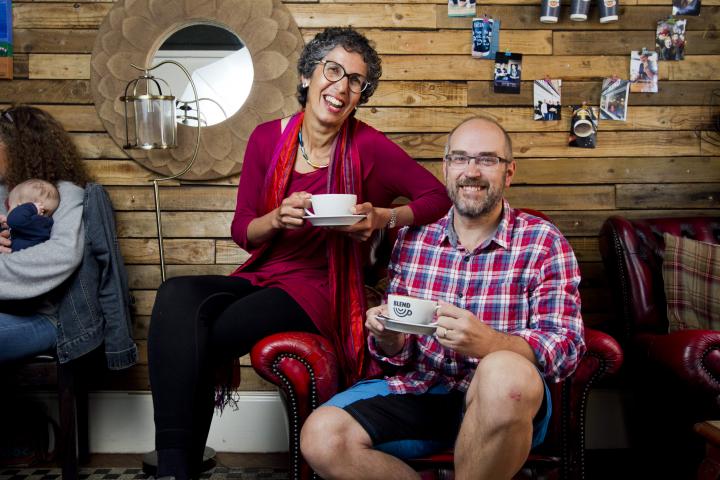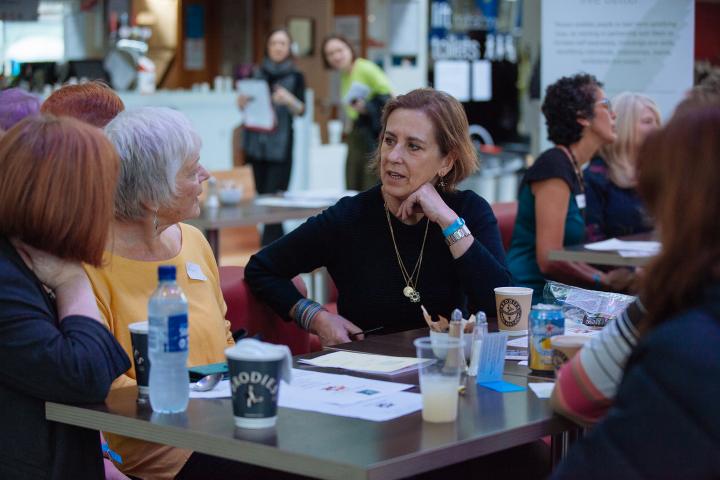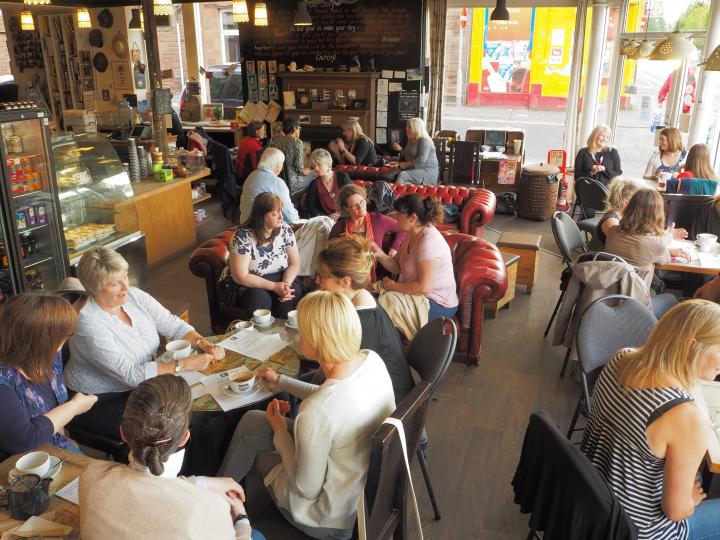Pause and refresh
Alumna Rachel Weiss on breaking taboos at the Menopause Cafe.

What the world needs now is to take time out to talk about taboo subjects. That’s the view of alumna Rachel Weiss (MSc Knowledge Based Systems, 1990) who set up the Menopause Cafe to offer women, and their partners, friends and family, a fresh approach to opening up about this natural but often undiscussed phase of life. Here she explains how it all began.
By Rachel Weiss
Before my first period, I knew what to expect (roughly), who to talk to (my mum) and what my options were (tampons or sanitary towels).
Before my first pregnancy, I knew what to expect (roughly), who to talk to (my GP) and what my options were.
Before my first baby was born, I knew what to expect (roughly), who to talk to (other parents) and what my options were.
Before my menopause, I hadn’t got a clue.
Friends didn’t talk about it, it wasn’t mentioned in any of the fiction or non-fiction books I read, there was nothing in the media. You would think it was a minority interest, but I knew it was inevitable for me and for half the population; so why was there so little information and conversation out there?
As a former girl guide, I like to be prepared; but all I knew about the menopause was that my periods would stop and I might experience hot flushes. So I read up on the raft of possible symptoms: dry skin, anxiety, loss of confidence, restless legs, vaginal dryness, depression and insomnia. However, I also wanted to hear stories from other women, especially from those who had come out the other side. What were the plus points? What had they learned?
I had already run Death Cafes in my home town of Perth. These are pop-up events where people, often strangers, gather to drink tea, eat cake and talk about death. So I asked Jon Underwood, founder of the Death Cafe movement, if we could set up Menopause Cafes along the same principles, those being:
- With no intention of leading participants to any conclusion, product or course of action.
- As an open, respectful and confidential space where people can express their views safely.
- On a not-for-profit basis.
- Alongside drinks and cake!

The power of taboos, broken by talking
Jon’s Death Cafes are helping to break the taboo around talking about death. As a counsellor and coach, I know the power of talking to heal wounds, to take the sting out of fear, to help connect us with other people. The #MeToo movement is showing how talking about abuse, rather than keeping silent, empowers the survivors and makes society more aware and more likely to believe people when abuse happens. We are breaking down the taboo of talking about child abuse, with similar effects, and are beginning to open up about mental health.
Taboos keep people silent, which disempowers them. Period. End of Sentence, a film showing women breaking the taboo around menstruation in India, recently won an Oscar. I believe menstruation and menopause are taboo subjects in the workplace. In our quest for equality, women pretend to be the same as men, with no monthly physical or emotional fluctuations. I hope the time has come for us to move on from equality, to valuing our diversity.
The impact of the menopause taboo at work and at home
A few years ago one of my employee’s migraines increased in both frequency and severity. She didn’t know why her usual coping strategies weren’t helping. I’d read that migraines can increase during the menopause and perimenopause and wondered whether that could perhaps be a factor. She hadn’t realised the two could be connected.
The impact of silence and ignorance about the menopause in relationships can be devastating.
Our conversation gave her confidence to approach her GP again, to book a physiotherapy appointment and to take conscious breaks from screen work. It took several months, but the symptoms abated, and she had hope that this too would pass. As an employer, I am glad I was informed enough to suggest the possible link with the menopause and that my employee was comfortable enough discussing that possibility.
The impact of silence and ignorance about the menopause in relationships can be devastating. Some women avoid sex due to vaginal dryness, which can lead to avoiding any form of physical intimacy. Partners may feel rejected, unattractive and unwanted. Add to this the possible mood swings of anger, depression and anxiety and who knows how many divorces and relationship break-ups could be prevented by talking about the menopause and its physical and emotional effects?

The start of the Menopause Cafe
Jon gave his permission for us to use his format to start conversations about the menopause. My husband, Andy (MSc Computer Systems Engineering, 1990) set up a website, we did some PR and on a sunny evening in June 2017 we sat in a Perth cafe waiting to see whether anyone would join us for the world’s first Menopause Cafe.
We needn’t have worried: 28 women and men came to talk menopause. People sat at tables, discussing whatever they wanted, often starting with the simple question: Why are you here? Every 20 minutes, we encouraged people to move to a different table and start new conversations. There was much laughter and lots of chat, with visitors making comments such as “I talked about more intimate matters to these strangers than I have to my friends” and “Now I feel normal, I know it’s not just me, I’m not going mad!”
Many more people heard about us on the radio, press and TV and started their own conversations at home. One couple saw me on the STV news that night: he said, “You should go to that.” So she jumped in the car and joined us 15 minutes before the cafe finished.
On the bus, a neighbour asked how the Menopause Cafe had gone and another lady joined in saying she had read about us in the paper. I sat there while these two women in their 70s talked about their experiences of the menopause – on a bus! In Perth!
That’s what we want – to start conversations about the menopause, to make it an ordinary topic of conversation. Our purpose is to increase awareness of the impact of the menopause on those experiencing it, their friends, colleagues and families, so that we can make conscious choices about this third stage of life.
We thought this might have been a one-off event; however, I secretly hoped it would inspire a worldwide network of Menopause Cafes.
We use a social franchise model, so volunteers worldwide can host their own Menopause Cafe. There have now been more than 170 Menopause Cafes, with more than 1,700 participants, in all four nations of the UK and one in Toronto. We’ve become a registered charity, with Kirsty Wark as our patron, and gained the Prime Minister’s Point of Light award for volunteers making a change in the community.
Several employers hold Menopause Cafes at Work including SSE, the Universities of Leicester, Birmingham and Sheffield, NHS Trust Velindre and Action for Children. We even offer a how to guide to running a cafe on our website. All you need is a venue, refreshments, a welcoming attitude and an open mind.

Philosophical as well as practical
Initially conversations focus on the medical and practical aspects of the menopause, but often they move on to the more psychological and philosophical:
- What does it mean to be an older woman in today’s society?
- Is my body forcing me to put myself first after decades of putting others first, whether through family or work?
- Is now the time to think about “I want” or “I need” rather than “I must” or “I should”?
This broader conversation led to us running the world’s first Menopause Festival, #FlushFest, in Perth last year, giving visitors a real chance to break the taboo while having some fun.
It was such a success we went on to hold our second Menopause Festival in April this year. The Friday afternoon focused on ‘Menopause at Work’ with talks on employment law, case studies of supportive workplaces, menopause policies and the government report called The Effects of Menopause Transition on Women’s Economic Participation in the UK. The Saturday offered creative writing and photography workshops, as well as workshops on mindfulness, cognitive behavioural therapy and exercise, a Q & A session with a sexual health doctor and an inspirational speaker flying in from the US.
As for me, well, it still hasn’t happened yet (although I now recognise that I’m perimenopausal). However, I feel more prepared and able to look forward to this third stage of life and to support my friends and colleagues through ‘the change’.
Watch
Watch an introduction to the Menopause Cafe by Rachel Weiss.
Please note, this is a third party video. If subtitles are needed, these can be turned on in YouTube settings.

